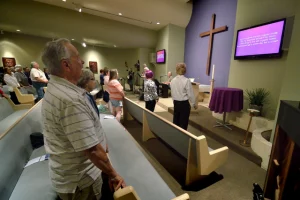Lessons for Seasons of Discouragement

Have you ever had one of those days where it seemed like nothing you did worked out the way you thought it would? Last week, I woke up late because I fell back to sleep after my alarm went off. The set of scrubs I planned to wear had an unknown stain on them, so I had to grab another pair– which is when I realized I hadn’t taken them out of the washer the night before. I made coffee then realized we were out of coffee creamer. I resigned myself to a cup of bitter, black coffee, only to burn my mouth on it. On my way to work, my car reminded me that I had forgotten to get gas the day before and when I finally got to work, my first patient of the day was a “spicy” cat who scratched and bit me. Nothing I touched seemed to go according to plan.
By 9 am, I needed a do-over.
I think we’ve all had days like that. But what happens when those days seem to turn into weeks…or even months? When, like the Rembrandts sang, “it hasn’t been your day, your week, your month, or even your year?”
In replant ministry there can be times where nothing seems to go right. What do we do when we’re in a season of discouragement?
On a recent episode of the podcast, Jimbo and Bob pointed us toward 2 Corinthians 1:10. Paul’s words to the Corinthian church give us a guide for our own seasons of frustration.
Paul’s Affliction in Asia
In Paul’s opening words to the Corinthian church, he tells them of all he has suffered since his last letter. In verse 8 he alludes to an affliction he suffered in Asia, which was so great that he “despaired of life itself.” Paul was to the point of thinking death might be the only outcome for his struggle– or at least preferable to it!
Paul could be referring to any number of trials. In Ephesus, Paul faced an angry mob, imprisonment, beatings, and general suffering. He could perhaps be referring to his “thorn in his flesh” that he discusses later in the same letter to the Corinthians (2 Cor. 12:7). We don’t know exactly which specific affliction Paul is referring to, but we know it was bad enough for him to think death was more appealing.
I would be lying if I said I hadn’t felt the same way at some points in our replant journey. I’m sure you have, too.
But Paul doesn’t give up. He tells the Corinthians that his suffering led him not to death, but instead to God, the giver of life. He was forced to rely on God and not his own power through those trials. Then Paul tells them that he was able to find peace in his suffering by looking to his past, present, and future in Christ. This instruction helps us, too.
Past Victories
Paul opens verse 10 with a look at his past. “He [has] delivered us from such a deadly peril.” Paul focused on the fact that God had delivered him before.
When we go through seasons of discouragement, one of the best reminders for us is to look back at our past victories in Christ. One of my favorite sayings is, “So far, you’ve survived 100% of your worst days.” It’s a good reminder that I’ve had other victories. There have been times where I didn’t think I could stand, but I did, and I’m still standing.
Bob used another phrase from a pastor he once knew: “If Jesus can take care of your salvation, there ain’t nothing he can’t take care of.” Christ forgave your sins. All of the trials of this world are nothing compared to Christ removing the debt of sin in our lives. But not only has He forgiven us of our sins– His death also satisfied the wrath of God so that we now have peace with God.
God has delivered you from sin. And because of this truth, we can trust in God. This moment in your ministry is not something that will stop God from moving on your behalf. After all you’ve seen God do in your life, don’t you think He’s big enough to handle your current crisis?
Present Assurance
Paul next says, “and He will deliver us.” (emphasis mine) Paul was assured that his affliction was not the end of God’s work in his life. He was able to look at his present circumstances and know that God was still working within them. He was still experiencing struggles and trials, but he saw God’s hand in them.
One of the things we forget as we struggle is that whatever we are going through is not a surprise to Jesus. There wasn’t an emergency session in the Trinity with hand-wringing and frantic scrambling to find a crisis-management plan. Your circumstances were not unforeseen by God. And since He knew what was going to happen, you can be assured that in this present moment, God has given you all that you need to get through it.
God’s deliverance doesn’t always look like we think it will. As Bob pointed out, “If God operated how we wanted him to operate, he wouldn’t be God… And we would be.” Sometimes, God’s deliverance is painful. Sometimes, it’s frightening. Sometimes, it doesn’t come as quickly as we wish. But rest assured, God will deliver.
Future Hope
In the next line of his letter to the Corinthians, Paul writes, “On him we have set our hope that he will deliver us again.” Paul is now looking toward the future, knowing God will deliver him again. Paul knows that struggles are not a one-time event. We are not free from struggles just because we’ve gone through one. But Paul specifically says that his hope is not in himself. His hope is in Jesus.
When we hope in our circumstances, we are engaging in a futile exercise. Our circumstances are always changing– just because today was great doesn’t mean tomorrow will be. In a world of unknown elements, Christ is our only firm foundation, the only hope we have for deliverance.
Romans 8:28 promises us that God is working all things toward good. Our suffering is not worthless. It is leading toward God’s good and sovereign plan. This is for God’s good, and for His glory. Our future seasons of discouragement are not without benefit. He will use it to sanctify and purify us. He will burn off the idolatry of self-reliance and self-centeredness. Depending on Him allows us to see His glory in our trials.
One Last Thing

In those moments where everything is going wrong, it’s easy to feel like we will never see victory again. I am sure that Paul wondered in Ephesus if he would ever be able to see the believers in Corinth or go to Rome as he had planned. But one of the things we must remember about seasons of discouragement and frustration is that they are seasons, not a lifetime.
When we are in the middle of struggles and trials, we have to think of it like Winter. Is it cold and dark and even sometimes bitter? Yes. But in that season, deep in our souls, God is planting seeds of victory. Soon, it will be Spring and we will experience new growth. Some day, we will be in Summer and we will feel the joy and warmth of God’s presence as our ministry grows and flourishes. And one day we will see a Harvest.
Inevitably, we will experience Winter again. And that is when the season we are going through now will be a past victory that brings us hope.
He has delivered. He will deliver. He will deliver us again.



 Stewardship is not simply money management. As Rick said, stewardship is not about fund-raising, but Jesus following. Stewardship i
Stewardship is not simply money management. As Rick said, stewardship is not about fund-raising, but Jesus following. Stewardship i
 As a leader, one way to help communicate with your congregation is by setting some time in place where they can hear about these structures. When I was a member at
As a leader, one way to help communicate with your congregation is by setting some time in place where they can hear about these structures. When I was a member at 
 In the book
In the book 
 No matter what you do for your own self-improvement, you will encounter hardships. But Jimbo and Bob have done a great job identifying the
No matter what you do for your own self-improvement, you will encounter hardships. But Jimbo and Bob have done a great job identifying the 





 In the process, we may find out that there are some lay members who are gifted, skilled, and adequately able to do far more than we can. God has spiritually gifted each member in some type of way, and it’s our responsibility to help members engage with God’s work both in and outside of our churches.
In the process, we may find out that there are some lay members who are gifted, skilled, and adequately able to do far more than we can. God has spiritually gifted each member in some type of way, and it’s our responsibility to help members engage with God’s work both in and outside of our churches.


 number of men in women leading our churches who are emotionally empty and spiritually dry. It is the story of a neglected soul and mismanaged character. Of a slow drift into relational isolation. Of being seduced by ambition. These leaders didn’t intend for it to happen, but somewhere along the journey they stopped paying attention to what was going on inside of them. The shift was incremental and at times imperceptible.” (p. 19)
number of men in women leading our churches who are emotionally empty and spiritually dry. It is the story of a neglected soul and mismanaged character. Of a slow drift into relational isolation. Of being seduced by ambition. These leaders didn’t intend for it to happen, but somewhere along the journey they stopped paying attention to what was going on inside of them. The shift was incremental and at times imperceptible.” (p. 19) How do your decisions affect other people involved in your ministry? Could it be said that you do nothing out of selfish ambition or conceit, and count others more significant than yourself? This caution is meant to cause us to look outwards, towards those around us.
How do your decisions affect other people involved in your ministry? Could it be said that you do nothing out of selfish ambition or conceit, and count others more significant than yourself? This caution is meant to cause us to look outwards, towards those around us. 
 The type of evangelism that our churches need to recapture is not an old program that needs to be resurfaced. It was the method of evangelism that Jesus used: daily, relational evangelism for every believer, every follower. The way that Jesus encouraged his followers in evangelistic engagement was part of what it meant to be a follower of Christ.
The type of evangelism that our churches need to recapture is not an old program that needs to be resurfaced. It was the method of evangelism that Jesus used: daily, relational evangelism for every believer, every follower. The way that Jesus encouraged his followers in evangelistic engagement was part of what it meant to be a follower of Christ. 
 In his third missionary journey, when Paul wrote this letter, he was looking back on many years of serving the Lord and sharing the gospel with others. As he looks back, he says that there is not anyone that comes into their path that they saw as just a person. How do we see people? Do we see them as flesh and bones, or do we recognize that God has people in our lives for a reason? I wonder if our heart for evangelism would change if our view of people changed.
In his third missionary journey, when Paul wrote this letter, he was looking back on many years of serving the Lord and sharing the gospel with others. As he looks back, he says that there is not anyone that comes into their path that they saw as just a person. How do we see people? Do we see them as flesh and bones, or do we recognize that God has people in our lives for a reason? I wonder if our heart for evangelism would change if our view of people changed.
 Unexpressed expectations always lead to disappointment and conflict. If you are a few months into the job and are being compared to the former pastor, whether negative or positive, it is unfair to your ministry. Asking this question during the interview process will encourage the search committee to make sure they don’t compare you to a previous leader. You have your own gifts and personality that mesh with ministry. Asking this question can tell you a lot about a church, specifically if they have expectations that go beyond the scope of regular ministry work. Church committees should have a clear job description that goes over the daily expectations of their pastor. Also take time to discuss any “spoken,” but not “written” expectations.
Unexpressed expectations always lead to disappointment and conflict. If you are a few months into the job and are being compared to the former pastor, whether negative or positive, it is unfair to your ministry. Asking this question during the interview process will encourage the search committee to make sure they don’t compare you to a previous leader. You have your own gifts and personality that mesh with ministry. Asking this question can tell you a lot about a church, specifically if they have expectations that go beyond the scope of regular ministry work. Church committees should have a clear job description that goes over the daily expectations of their pastor. Also take time to discuss any “spoken,” but not “written” expectations. Like the church health question, this helps you understand how they see the surrounding community. If
Like the church health question, this helps you understand how they see the surrounding community. If  While you may be afraid to ask this question, it is important to ask, nonetheless. I’ve heard people say, “If God called me here, I shouldn’t worry about the money.” But if you have a family, medical expenses, bills, vehicle payments, and student loan debt, you should seriously consider this question: would God call you into a situation where you couldn’t provide for your family? In seeking God’s will for your life, it’s important that we factor in our families and our life situation. As a pastor, your first priority is to your family, and then your church.
While you may be afraid to ask this question, it is important to ask, nonetheless. I’ve heard people say, “If God called me here, I shouldn’t worry about the money.” But if you have a family, medical expenses, bills, vehicle payments, and student loan debt, you should seriously consider this question: would God call you into a situation where you couldn’t provide for your family? In seeking God’s will for your life, it’s important that we factor in our families and our life situation. As a pastor, your first priority is to your family, and then your church. 





 Our younger generation has been heavily influenced by technology. Every time I open up a social media app, I normally run across a sermon clip of a mega church speaker with skinny jeans and Nike Air Force ones, giving some catchy slogans about a scripture in the Bible. The catchphrases are not always bad, and are sometimes very powerful. But growing up observing that environment made me think that this type of ministry was the pinnacle of leadership.
Our younger generation has been heavily influenced by technology. Every time I open up a social media app, I normally run across a sermon clip of a mega church speaker with skinny jeans and Nike Air Force ones, giving some catchy slogans about a scripture in the Bible. The catchphrases are not always bad, and are sometimes very powerful. But growing up observing that environment made me think that this type of ministry was the pinnacle of leadership. 